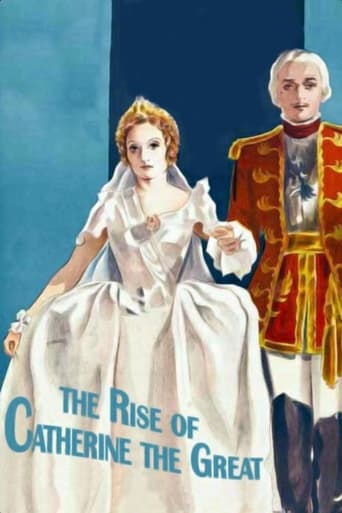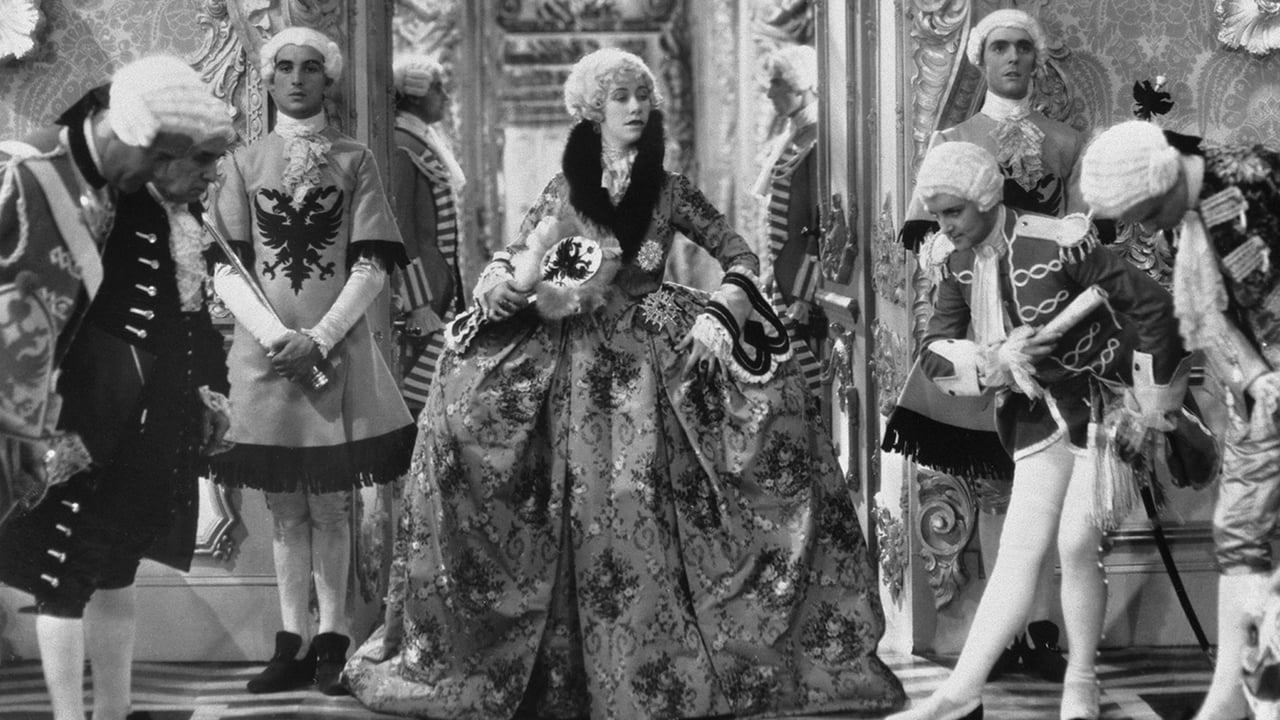Robert J. Maxwell
Douglas Fairbanks, Jr. is Peter III, the heir to the throne of Russia in the mid-1700s. A tempestuous character, he shouts out orders and is unhappy. Well, who wouldn't be? He's dressed in some kind of bear skin outfit and is made up like Frankenstein's monster, with a silver wig, black eyebrows, black false eyelashes, a black mustache, and two black beauty spots. He could clear a room without a gun.His bride-to-be is brought to him from Germany. They've never met before and she mistakes him for an ordinary castellan of no particular prominence. He quickly twigs but Catherine carries on about how much she's dreamed of marriage to him and how little she cares for empire. It all sounds a bit like Fred and Ginger.Gradually, Fairbanks comes to accept her as the genuine artless article and whisks her off to be married. This is quite a mental achievement for Fairbanks. After all, she's Prussian, not Russian, doesn't speak the language and is Lutheran rather than Russian orthodox. On top of that -- the real obstacle -- is that she was born Sophie Friederike Auguste von Anhalt-Zerbst-Dornburg. I ask you, would you marry someone with a name like that? Even if she looked like Botticelli's Venus? So they called her Yekaterina.As played by Elisabeth Bergner, who never looks more than vaguely cute, the new bride is all winsome and proud and overwhelmed by the sumptuousness of the Russian court. Flora Robson is Fairbanks' aunt, Empress Elizabeth, always impatient and angry. Florid Robson -- I mean Flora, of course -- was always some kind of Empress or Queen, whether in England or China or Russia. It didn't matter. She radiated disdain. She glowed with authority. Her Empress here is sexier than usual. In fact, young as she was, her big face was compellingly ugly. And she got what she wanted. Historically, she was a terrible rake and played doctor with everyone.Alexander Korda's direction is functional and expressive. He really manages to capture the splendor of the court, even if it's rendered in fuzzy black and white. When Fairbanks and Bergner are married, the priest puts the wedding ring on Bergner's right hand, as he should.This is no place to recount the history of Russia, so putting it in a nutshell: Robson dies, Fairbanks takes over, goes increasingly nuts, until Bergner finally consents to exile Fairbanks and rule Russia herself. The end. There is only the barest hint of what her rule would be like.She became a benign dictator, brought Russia into the modern world, implemented all sorts of reforms, and corresponded with Voltaire. What we've watched is a filmed play about palace love and intrigue, and not a bad one. There are no outdoor scenes, not a shot is fired or a sword lifted in anger. Someone should have made "Catherine the Great, Part II." As it is, at Bergner's moment of triumph, she stands on a balcony, arms raised, listens to the cheering crowd, and almost swoons as she cries, "They love me!" And then the host presents her with the Academy Award.
Michael Neumann
Yet more intrigue from the court of imperial Russia, which (at least according to movie history) must have functioned entirely on plots, counter-plots, rumors, gossip and scandal. Produced in England by the celebrated Alexander Korda, this handsome spectacle stars Douglas Fairbanks Jr. (less dynamic but a better actor than his father) as the petulant heir to the royal throne who marries the petite German princess Catherine more or less against his will. Favored by the Queen Mother and beloved by her subjects, the sensible and modest Catherine has only one flaw in her character: an unquenchable love for her power-mad, playboy husband. Their bittersweet love/hate rivalry must have seemed quite sophisticated to a 1934 audience, and seen today the film still possesses a freshness rarely seen in early sound productions, thanks in large part to a quality script and some lively, natural performances.
bkoganbing
Although Marlene Dietrich was a far more glamorous Catherine the Great, closer to the real one was definitely Elizabeth Bergner in this British production from Alexander Korda. The former Princess Sophia of Anhalt-Zerbst, one of many small pieces of turf in Germany before that country became a country instead of a geographical expression, pulled off something unique in history. She came as a promised bride to the tsarevitch who in this case was Peter, nephew of the Empress Elizabeth of Russia. Through her own will and genius for intrigue, this Queen Consort, without a drop of royal blood of Russia in her, got to rule Russia and well for over 30 years after deposing her husband. Woman must have done something right.The film here like the one in Hollywood ends with the deposition and death of the Czar and Catherine taking over. We don't see the regal, confident, and promiscuous empress Catherine was to become. We see her as a shy and overwhelmed German Princess who grows in her role as her husband won't in his. Catherine grows in her character as Elizabeth Bergner does in this part.Sam Jaffe as Peter is far closer to the mark of the real character of that unfortunate soul than Douglas Fairbanks, Jr. is in this film. Yet Fairbanks gives an extraordinary performance, far from the swashbuckling parts that his father patented on the silent screen. In fact both the Fairbanks were in the UK at the same time. Fairbanks senior gave his farewell screen performance in the Private Life of Don Juan and his son did about seven films for four years of which this is probably his best effort.The pleasure loving Empress Elizabeth as done by Flora Robson is light years different from Queen Elizabeth in Fire Over England and The Sea Hawk that Robson did later, but still very nicely done.Alexander Korda perfectly captured the mood and feel of old Romanov Russia as taken over by a usurper, a popular one, but still a usurper.
psteier
The alternative title "The Rise of Catherine the Great" is much more accurate since the picture ends with her getting the throne.The costumes and sets are Grade A Hollywood (compliment).Flora Robson (Empress Elisabeth) has the best lines and delivers them impressively. Elisabeth Bergner (Catherine) does well in her scenes with the Empress. Douglas Fairbanks Jr. (Grand Duke Peter) seems out of his depth.



 AD
AD


